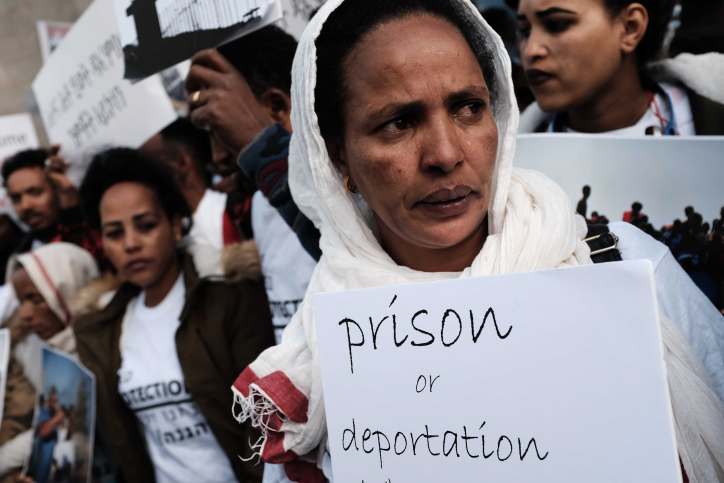The campaign to stop the deportation of the asylum seekers is an encouraging reminder that Israeli society’s collective conscience has not yet totally disappeared.

It is impossible not to gaze in astonishment at the Israeli public’s overwhelming mobilization for asylum seekers under threat of deportation. From educators to academics, from pilots who say they will refuse to fly asylum seekers against their will to residents of south Tel Aviv who oppose the deportation, it seems that not a single sector of Israeli society has refrained from expressing its contempt for the move.
The campaign is also understandably human, and there are a few explanations for why we have been seeing such a touching outpouring of support. Firstly, there is a real threat to asylum seekers’ lives, should they be sent back to Africa. Moreover, the shadow of Jewish history looms large over the public discourse on refugees and deportations. There is the fact that African asylum seekers — as opposed to Palestinians from Gaza and the West Bank, for instance — are physically present in our daily lives, and not virtual figures on the news. And demographically speaking, the asylum seekers are relatively few, and thus their plight can be contextualized as a humanitarian, rather than a political issue that could potentially pose a threat to the idea of Israel as a “Jewish and democratic” state.
Beyond those explanations, however, lies a deeper reason for this unprecedented campaign, which has seemingly awakened the collective Israeli conscience from its coma. For many years now, the Israeli public has looked at itself in the mirror and been frightened by its reflection. From testimonies by Breaking the Silence to the reports of a humanitarian catastrophe in Gaza and the demolition of homes and schools in the West Bank, we see a violent, vengeful, and belligerent society in our reflection. For years we learned to use all kinds of different mechanisms to try and live with this horrifying image. We have tried to frame the conversation about the occupation as a security issue rather than a political one. We have victimized ourselves. And worst of all, we have attempted to shatter this mirror whenever it threatens the protected spaces we built for ourselves, by persecuting and delegitimizing human rights organizations or closing off Gaza to journalists.
But our reflection isn’t going anywhere. We can continue to call Ahed Tamimi a “terrorist” until the end of time, but even the subconscious of the most extreme right winger knows that keeping a 17-year-old girl in prison for slapping a soldier has nothing to do with security, but, rather, with the ego of the occupier. And we know quite well that silencing soldiers who talk about the injustices committed in our name does not make those injustices cease to exist. Somewhere in our collective subconscious, we know exactly what our reflection looks like — and it is so dramatically different from our moral self image, from the story we want to tell about ourselves. There is something unsettling and mind boggling about that dissonance — for every society.

The campaign for the refugees and asylum seekers seeks to resolve — if only partially — this dissonance. It allows us to update our national story, to beautify the reflection in the mirror. No longer are we an occupying, oppressive, and violent society, but a compassionate, humane, and active one. I do not, in any way, mean to imply that Israeli society is being consciously manipulative by supporting African asylum seekers — I believe wholeheartedly in the pure intentions of every single Israeli who is mobilizing on behalf of their struggle. Moreover, there is something touching and not obvious in discovering that, even after so many years in which abusing the weak has become a way of life, our society’s collective conscience has not been totally destroyed. Acknowledging this is not only heartwarming — it is important for our survival as a society.
And yet, perhaps more than ever, it is important to remind ourselves that the asylum seeker issue, and the attempts to deport them to their deaths is not merely a humanitarian issue — it is a political question inextricably linked to the most fundamental definitions upon which Israel was founded and built. That Israel has no immigration policy apart from Jewish immigration is a political question with humanitarian implications — not only when it comes to African asylum seekers, but also in its treatment of a young Palestinian-Israeli who wants to marry a young woman from Hebron and continue living in his home. The way Israel instrumentalizes its treatment of “the other” — be it an Eritrean refugee or a Palestinian laborer at a checkpoint — is the result of a racist ideology that comprises the political framework in which we live.
I hope that the mobilization for asylum seekers bears fruit and the shameful attempt to deport them is stopped. I also hope that our conscience and morality, which we learned to reuse after they seemed to have atrophied completely, will serve us as a society even after we stop the deportation. Then we can finally work to fix our reflection, instead of trying to break the mirror entirely.
This article was first published in Hebrew on Local Call. Read it here.

